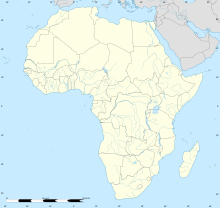Gâra Djebilet mine
 entrance to the city of Tindouf | |
| Location | |
|---|---|
| Location | Tindouf |
| Tindouf Province | |
| Country | Algeria |
| Coordinates | 26°53′25.750″N 7°10′11.831″W / 26.89048611°N 7.16995306°W |
| Production | |
| Products | Iron ore |
| Type | Iron mine |
| History | |
| Discovered | 1952 |
| Opened | 2022 |
The Gâra Djebilet mine is an iron mine located in Tindouf Province in western Algeria. It represents one of the largest iron ore reserves in the world. Its reserves are estimated at 3.5 billion tons, of which 1.7 billion tons are exploitable.[1]
History
The Gâra Djebilet mine was discovered in 1952 by the French geologist Pierre Gevin.[2]
On June 15, 1972, Morocco and Algeria signed a joint agreement for the development of the mine. This provides for the exploitation of the Algerian mine and the transport of iron through Morocco via its access to the ocean,[3][4] but this agreement has not been followed up.
On March 12, 2017, the National Iron and Steel Company (Feraal) signed a Memorandum of understanding with the Chinese company Sinosteel equipment & engineering to carry out feasibility studies for the development of the deposit. The contract also includes the performance by Chinese research centers of dephosphorization and enrichment tests on four different processes. In 2015, Algerian laboratories were able to achieve a dephosphorization rate of around 0.1%.[5]
Its operation is formalized on July 30, 2022.[6]
Characteristics
The Gâra Djebilet deposit extends over 131 km2 (51 sq mi), its exploitable reserves are estimated at 2 billion tons of ore with a content of 58.57% iron.[7]
The industrial exploitation of Gâra Djebilet ore begins in 2022 with a planned production of 2 to 3 million tonnes of ore per year in a first stage (2022-2025), then 40 to 50 million tonnes/year from 2026.[6] The project will position Algeria as a leader in the African steel and metallurgical industry.[8]
Some experts[who?] have doubted the profitability of the project, Gâra Djebilet being characterized by a high content of phosphorus present in the iron, requiring to obtain a quality ore, an operation called dephosphorization, which is expensive and complex.[9]
References
- ^ "Mine industry : Minister Yousfi underlines possible restart of Gara Djebilet". elmoudjahid.com. 2013. Retrieved 2013-06-12.
- ^ Kazi Tani, Nacereddine (30 December 2020). "Quel avenir pour Gara Djebilet ?". cresus.dz (in French). Archived from the original on 26 August 2022.
- ^ "Journal officiel de la République algérienne démocratique et populaire" (PDF) (in French). 15 June 1973. Archived (PDF) from the original on April 2, 2015.
- ^ "Le roi Hassan II et le président Boumediène ont consacré par un accord de coopération le règlement de leur litige frontalier". Le Monde.fr (in French). 1972-06-17. Archived from the original on March 21, 2021.
- ^ "chinois Sinosteel chargé d'étudier la faisabilité du projet du Gisement de fer de Gara-Djebilet". Huffpost.
- ^ a b Dib, Nassima (July 30, 2022). "Mine de Gara Djebilet: une production allant entre 40 et 50 millions t/an à l'horizon 2026". Algeria Press Service (in French). Archived from the original on July 30, 2022.
- ^ Bouaricha, Nadjia (November 27, 2019). "L'étude du projet d'exploitation arrive à sa phase finale : Le gisement de Ghar Djebilet relancé ?". El Watan. Archived from the original on July 30, 2022.
- ^ Dia, Maimouna. "Sidérurgie : pour augmenter la production d'acier, l'Algérie mise sur la mine de Ghar Djebilet". La Tribune (in French). Archived from the original on November 26, 2018.
- ^ "Gisement de Gara Djebilet : le projet est-il viable ?". TSA (in French). August 9, 2022. Archived from the original on August 9, 2022. Retrieved 2022-08-17.


